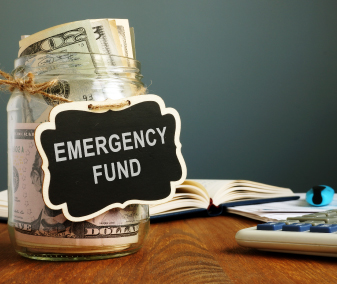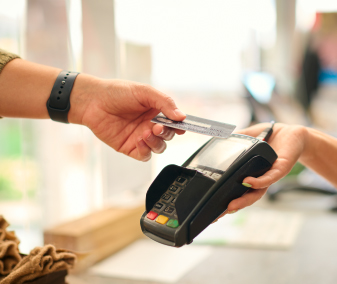
Indiana Members Credit Union Blog
Welcome to the Indiana Members Credit Union Blog!

Auto Loan Rates Explained: 36, 48, 60, 72, 84 Month Terms, Which Is Right for You?
Buying a car is exciting, but figuring out the best way to finance it can feel overwhelming. One of the biggest decisions you’ll make is choosing the right loan term, the length of time to pay off your car. Should you go with 36 months, 48 months, 60 months, 72 months, or 84 months? Each option has its pros and cons; understanding them can save you money in the long run.

Your 1-2-3 Approach to Paying for College
If you’re not sure how you’ll pay for college or what you can afford, taking it one step at a time can help. That’s why we’ve partnered with Sallie Mae® to bring you their 1‑2‑3 approach to paying for college.

Why the FAFSA® is Important (Like Really, Really Important)
Filing the FAFSA® (Free Application for Federal Student Aid) is your key to getting all kinds of financial aid for school—we’re talking federal, state, and school aid. If you want to qualify for the most free money you can, and pay less out of your own pocket, you need to file the FAFSA®. Nearly everyone who submits the FAFSA® qualifies for some aid.

Loans for Undergraduate, Career Training, and Graduate Students
Student loans from Indiana Members Credit Union in partnership with Sallie Mae® can help you pay for education expenses not covered by savings, scholarships, and federal loans. There’s a loan for you, no matter where you are in your higher education journey.

What Is the Easiest Type of Mortgage to Get Approved For?
Whether you’re a first-time homebuyer or have been through the process before, comparing your mortgage options can certainly feel overwhelming. While it might be tempting to go with the first affordable-seeming option you come across, the fact that the average mortgage loan takes up to 30 years to pay off underscores the importance of doing your research and securing favorable terms. Otherwise, the extra interest can really add up over time, which could cause additional, undue stress down the road.

What Are the Main Types of Home Loans You Can Get?
Have you been trying to figure out what type of mortgage you should get? Tired of searching for “best mortgage lenders” and not finding any real answers? Welcome to IMCU’s quick and easy guide to home mortgage loans and lenders! We’ve got the answer for you so you can stop searching. Let’s dive in!

Best Type of Mortgage Loan for First Time Home Buyers
Picture this: after many years of renting, you’ve finally received the key to your first home. That’s right—now you can paint the walls, put up as many pictures as you want, refinish the hardwood floors, or just simply enjoy a space that actually belongs to you! Purchasing a new home is an exhilarating experience that marks a significant milestone in life, especially if it’s your first house. The process is filled with anticipation and dreams as you explore neighborhoods, imagine parties in your living room, and visualize a space that reflects your personality.

How Do You Prepare for Financial Emergencies?
When unforeseen events such as natural disasters or technology outages occur, being financially prepared can greatly reduce stress and uncertainty. Understanding how to manage your finances during these times is more important than ever. Here at IMCU, we’re outlining practical steps to ensure you’re financially prepared for the unexpected—after all, it’s not a matter of “if” an emergency will happen but rather “when.”

What Are the Benefits of Commercial Cards?
28.4% of Americans have poor or fair credit, according to Experian. Yet, many businesses rely on their employees to use their personal credit cards for business expenses. Of course, the intent is to reimburse those employees in a timely manner… but things don’t always go as planned.
.jpg)
Commercial Real Estate Lenders
Starting and growing a business takes space—and space takes money. Whether you’re looking for office, retail, industrial, or a variety of other commercial properties to launch or expand your business, you’ll likely need a loan to seal the deal. After all, the average cost of commercial land and property for sale in Indiana is $717,952 (according to Land.com), which is a lot for small businesses to come up with—especially with other financial demands like equipment and staffing costs.

Types of Commercial Cards
Navigating commercial lending and deposits solutions is essential for any business’s finances to operate smoothly. Yet, with so many commercial lending options, it can be difficult to decide what’s best for your business.

Commercial Business Line of Credit Requirements
As a new business owner, the phrase “You have to spend money to make money” is anything but new. However, navigating the world of commercial lending and deposits can be confusing and frustrating for startups and small businesses who are still establishing themselves.

Merchant Services and Features
From commercial lending and deposits to cash and treasury management, a lot goes into a successful small business. Many small business owners realize the advantages of working with a merchant services provider to handle certain aspects of their business—things like providing efficient and secure credit and debit card processing. In this article, we’re exploring these merchant services: what they are, why you need them, and how partnering with Indiana Members Credit Union (IMCU) can help.

Cash Management for Businesses
Successfully running a business requires a lot of know-how and resources, from strategically managing cash on-hand to understanding the ins and outs of commercial lending and deposits. This all generally falls under the topical umbrella of treasury management—which also includes cash management.

What Are the Benefits of Remote Deposit Capture?
From member-focused commercial lending and deposits to treasury management services, Indiana Members Credit Union is in the business of championing small business. While running a business can be complex, you don’t have to do it alone. In this article, we’re going to take a closer look at one of our most popular service offerings: remote deposit capture.
.jpg)
Benefits of Health Savings Accounts
At Indiana Members Credit Union (IMCU), we want to empower you with the knowledge and resources you need to make smart decisions for your business. From our commercial lending and deposits offerings to business CDs and more, it’s our goal to provide our members with versatile and constructive solutions.

Different Types of Business Checking Accounts
In the broad category of commercial lending and deposits, there’s a whole universe of financial products and services designed to support your financial journey. Business CDs, lines of credit, payroll services, treasury and cash management…the list goes on and on. However, today we’re focusing on the financial heart of your business: the humble checking account. Think of it as the unsung hero, quietly managing your day-to-day transactions while you focus on the big picture. Although your business checking account may not be exciting, it’s an important tool and one you should put thought into choosing—not all business checking accounts are created equal!

What Are the Differences Between a Bank and a Credit Union?
The primary difference between banks and credit unions is their organizational structure. Banks are for-profit institutions, whereas credit unions are nonprofit organizations. This difference, among several others, are key when comparing banking organizations—and deciding which is best for you. Many people may not know that credit unions are a viable option for virtually every banking service, from commercial lending and deposits for business to opening a simple savings account.

Best Money Market Accounts
These days, business owners have plenty of options for managing and optimizing their finances, including a wide range of options for commercial lending and deposits. In fact, many of the products available for businesses are largely the same ones individuals might open to build their own personal savings via interest—including interest-bearing checking and savings accounts, money market accounts, certificates of deposit (CDs), and more. This article will offer a quick overview of these options, including their key advantages and interest-earning potential.

Business Certificates of Deposit
When considering commercial lending and deposits, it can be overwhelming to figure out what options are not only viable, but advantageous for your business. Here at Indiana Members Credit Union, our purpose is to help your business reach its longer term goals. We’ve put together this comprehensive resource for businesses to understand and leverage the power of business Certificates of Deposit in their financial strategies. This guide is for business owners who are seeking a secure and profitable way to manage your surplus cash. We’ll explore how Certificates of Deposits work, their benefits, how they differ from personal Certificates of Deposit, and how they can be an effective tool for financial growth and stability in a business setting. Let’s get started!
Blog Archive
Use the dropdowns below to read past posts of the Indiana Members Credit Union Blog.
